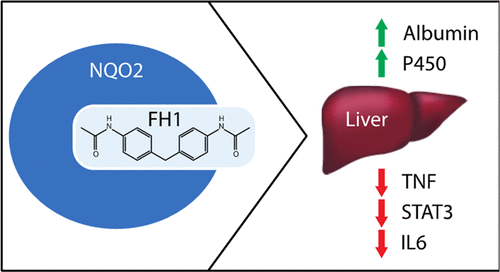当前位置:
X-MOL 学术
›
ACS Chem. Biol.
›
论文详情
Our official English website, www.x-mol.net, welcomes your feedback! (Note: you will need to create a separate account there.)
Identification of NQO2 As a Protein Target in Small Molecule Modulation of Hepatocellular Function
ACS Chemical Biology ( IF 4 ) Pub Date : 2021-08-24 , DOI: 10.1021/acschembio.1c00503 Arnout G Schepers 1, 2 , Jing Shan 1 , Andrew G Cox 3, 4 , Ada Huang 1 , Helen Evans 1 , Chad Walesky 3 , Heather E Fleming 1 , Wolfram Goessling 3, 5, 6, 7, 8, 9 , Sangeeta N Bhatia 1, 8, 9, 10, 11, 12, 13
ACS Chemical Biology ( IF 4 ) Pub Date : 2021-08-24 , DOI: 10.1021/acschembio.1c00503 Arnout G Schepers 1, 2 , Jing Shan 1 , Andrew G Cox 3, 4 , Ada Huang 1 , Helen Evans 1 , Chad Walesky 3 , Heather E Fleming 1 , Wolfram Goessling 3, 5, 6, 7, 8, 9 , Sangeeta N Bhatia 1, 8, 9, 10, 11, 12, 13
Affiliation

|
The utility of in vitro human disease models is mainly dependent on the availability and functional maturity of tissue-specific cell types. We have previously screened for and identified small molecules that can enhance hepatocyte function in vitro. Here, we characterize the functional effects of one of the hits, FH1, on primary human hepatocytes in vitro, and also in vivo on primary hepatocytes in a zebrafish model. Furthermore, we conducted an analogue screen to establish the structure–activity relationship of FH1. We performed affinity-purification proteomics that identified NQO2 to be a potential binding target for this small molecule, revealing a possible link between inflammatory signaling and hepatocellular function in zebrafish and human hepatocyte model systems.
中文翻译:

鉴定 NQO2 作为肝细胞功能小分子调节中的蛋白质靶标
体外人类疾病模型的效用主要取决于组织特异性细胞类型的可用性和功能成熟度。我们之前已经筛选并鉴定了可以在体外增强肝细胞功能的小分子。在这里,我们表征了其中一种命中 FH1 对体外和体内原代人肝细胞的功能影响斑马鱼模型中的原代肝细胞。此外,我们进行了模拟筛选以建立 FH1 的构效关系。我们进行了亲和纯化蛋白质组学,确定 NQO2 是这种小分子的潜在结合靶标,揭示了斑马鱼和人类肝细胞模型系统中炎症信号传导与肝细胞功能之间可能存在的联系。
更新日期:2021-09-17
中文翻译:

鉴定 NQO2 作为肝细胞功能小分子调节中的蛋白质靶标
体外人类疾病模型的效用主要取决于组织特异性细胞类型的可用性和功能成熟度。我们之前已经筛选并鉴定了可以在体外增强肝细胞功能的小分子。在这里,我们表征了其中一种命中 FH1 对体外和体内原代人肝细胞的功能影响斑马鱼模型中的原代肝细胞。此外,我们进行了模拟筛选以建立 FH1 的构效关系。我们进行了亲和纯化蛋白质组学,确定 NQO2 是这种小分子的潜在结合靶标,揭示了斑马鱼和人类肝细胞模型系统中炎症信号传导与肝细胞功能之间可能存在的联系。



























 京公网安备 11010802027423号
京公网安备 11010802027423号